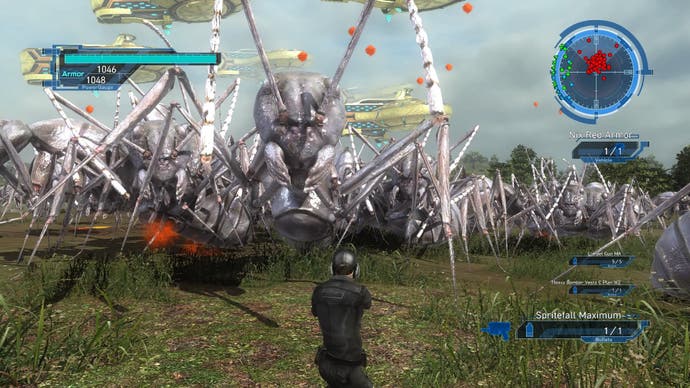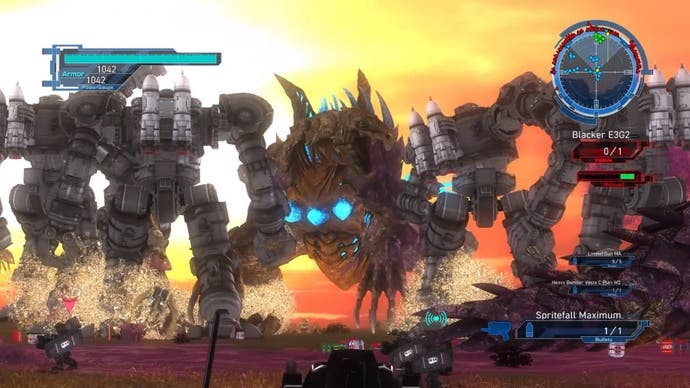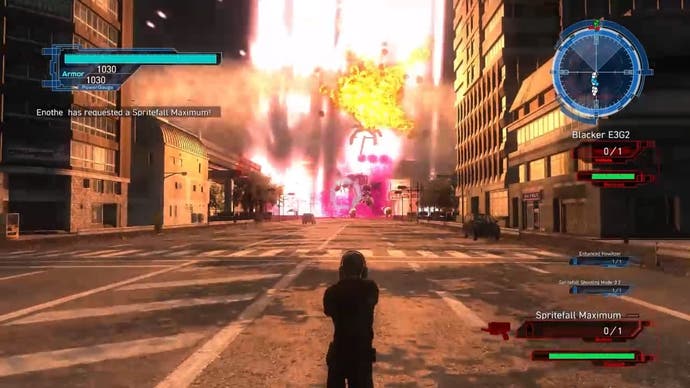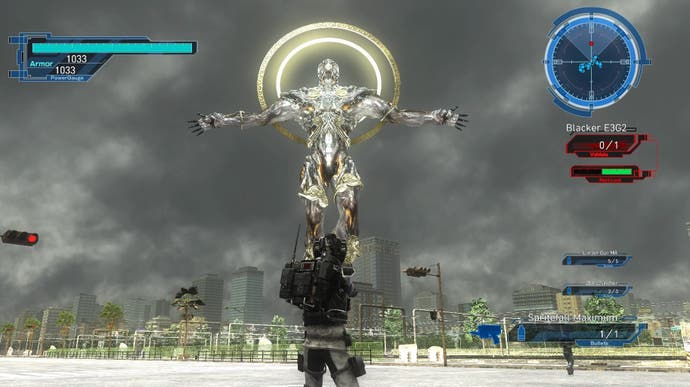Earth Defense Force is a wonderfully scrappy series with a surprisingly dark heart
Expect bugs.
This piece contains spoilers for several Earth Defense Force games.
Earth Defense Force is what you get when you turn Starship Troopers into a series of budget video games. Each entry in the series chucks you into the titular EDF and pits you against hordes of giant insects and other strange aliens. The graphics tend to be sub-par, the art style's pretty basic, and there's nearly always bad voice acting and cheesy writing too. So what's the attraction?
It's about priorities. All of the budget and attention - all the love - goes into the things the developer really cares about. Things like destructible skyscrapers, giant purple blood splatters, completely ridiculous weapons, and more insects than you could ever hope to defeat with a thousand rolled-up newspapers. There is a certain charm to playing a game that trades graphical prowess for pure, undiluted fun. And that B-movie cheese oozing out of every line of dialogue only helps.
The series has always been a bit niche - alright, a lot niche - but it has a fairly devoted fanbase. In fact, after years of relative neglect, EDF is actually picking up steam now: the games are beginning to run a little more smoothly on modern hardware, and they're even being brought to the west in a semi-timely fashion.
And while it's easy to write these games off as brainless fun - even if that's something of a compliment depending on your temperament - it would be unfair to say that they are entirely mindless. Going back to the series over the last few weeks I've discovered that hidden inside each of the games in the EDF series there is a weird sort of darkness that doesn't quite fit.

Take Earth Defense Force: Insect Armageddon, from 2011. Over the course of the campaign, you spend all your time fighting to hold back the constant stream of enemies. You slog your way through battle after battle only to have to try and escape a city before it is decimated in a brutal missile strike. Your team are completely stranded and seem to have no hope. Thankfully, at the last minute, a rogue pilot swoops in to save you. And yet, in one of the game's endings, this brave rescue attempt is quickly squished by an enormous nuclear-sized explosion from an alien mothership's lasers. Dark stuff.
Earth Defense Force 5 is the latest in the series, and it's also the best if you ask me. Not only is this the sharpest looking one so far, it is also the most stable and probably the largest. And it's definitely the one with the strangest undertones.
At the beginning of the campaign, you aren't in the army. You're just a civilian visiting one of the EDF's bases. Naturally, this visit is interrupted by giant acid-spraying ants burrowing in through the walls. There are soldiers trying to escort you to safety, and they give you some weapons to better look after yourself just in case. After a few hours of bug-squishing, though, it becomes clear that you're pretty good at this stuff, so the army tries to get you to join up.

One of these recruitment conversations goes like this:
"Have you made up your mind to become a soldier?"
"Being a soldier is awesome!"
"You'll receive a pension!"
"And there's no need to worry about your life after retirement!"
"But you will be disappointed by the amount of the death gratuity."
That's pretty messed up. It seems like they're saying you should join the army because you'll never need to think about retirement.
They're not wrong, either. Humanity is brought to the brink of extinction in EDF 5, and the EDF are constantly running low on members because everyone keeps getting eaten, or melted, or squashed.
In the face of such slaughter, the government has come up with a new initiative to combat the dropping employment rates that have been brought about by the imminent end of the world. If you join the EDF you'll get 10k straight away, then another 20k after three months. Pretty cool right? A few missions later, this is changed to 20k when you join and 50k after six months. Then it changes again shortly after that to 50k when you sign up and 100k after a year. If you are struggling to get people to fight because they are at great risk of dying, why not bribe them?
Satire in a game about giant space bugs is probably not that surprising - we're back to Starship Troopers again, in fact. But it's how EDF 5 chooses to conclude that really marks it out as a wonderfully chilling oddity.
In other words, guess who the final boss is...
In keeping with the campaign's pervading sense of doom, the climactic mission is truly humanity's last stand, one against a foe so incredibly daunting that everything has to be thrown at it. Any remaining civilians are given weapons and sent out to die.
And then the enemies start to appear. Up until this point you've been fighting the insectoid and alien hordes for 109 missions. Sure they got bigger, faster, and offered a few variations, but they were always something you knew you could take down.

Then comes mission 110. The bugs are gone and it's you against The Nameless, a figure who's completely different to everything else you've faced. Hovering above the ground with no regard to the laws of nature, and a giant halo radiating an unnatural light on its back, The Nameless isn't constrained by the same rules that affect anything else in the game. It simply wills enemies and attacks into being.
This goes beyond just being a boss fight. It quickly becomes obvious EDF 5 has chucked you into a battle with an actual god. And the storyline backs this up. In-game legends speak of a god who comes down to earth in an egg-shaped ship. Looking back from the perspective of the end-game, this is probably the craft you blew to pieces in the penultimate mission. Oops.
Amazingly, EDF 5 pulls this off, delivering a genuine thrill of the unexpected as it does so. And weirdly, I'm not sure you'd feel that same thrill if it wasn't such a singular game in the first place. Sure, you expect to kill gods in stuff like God of War or Asura's Wrath, but those games have to set these kinds of things up early: you're doing the bombastic and unthinkable from your first moments with the control pad in God of War, and so by the time you're kicking Zeus (or whoever it is) around in the final moments, it's all become kind of banal.
EDF, though? EDF seems like too knockabout a series to make this work, but deep down it's always been about escalation. Hate ants? How about giant ants! Taken down five of them? How about 500 of them! Deep down, EDF is Katamari with glistening mandibles. Onwards and upwards!
And, as Katamari ends with you rolling up the entire world - one of them does anyway, if memory serves - why shouldn't EDF 5 conclude with a bit of attempted deicide?
The only problem, of course - and it's a good one to have - is after you've done all that, how do you follow it up next time?









